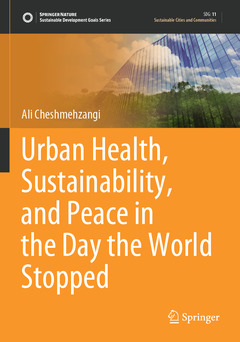Description
Urban Health, Sustainability, and Peace in the Day the World Stopped, 1st ed. 2021
Sustainable Development Goals Series
Author: Cheshmehzangi Ali
Language: English
Subjects for Urban Health, Sustainability, and Peace in the Day the...:
Approximative price 116.04 €
In Print (Delivery period: 15 days).
Add to cartPublication date: 09-2022
196 p. · 17.8x25.4 cm · Paperback
Publication date: 09-2021
Support: Print on demand
Description
/li>Contents
/li>Biography
/li>Comment
/li>
This book covers the nexus between urban health, sustainability, and peace.
'Urban Health, Sustainability, and Peace' is the first book that attempts to put these three critical areas together. This novelty approaches the subject matter by delving into evaluating what works, what does not work, and what should be done to achieve healthy cities. We believe this book will be beneficial to a wide range of stakeholders, particularly policymakers, planners, and developers, who continuously shape and reshape the structure and environments of our cities and communities. Unfortunately, in most cases, the healthiness of the cities may not be of their immediate concern. Nevertheless, it is the concern of the end-users, citizens, or simply those who live and work in cities and communities worldwide. To safeguard peace in cities, one has to consider sustaining urban health; and that is the main aim of this book.
The ongoing pandemic gives us an excellent reason to study cities' health. During such a disruptive time, we detect many flaws in cities and communities around the world. We primarily identify the negative impacts on sustainability and peace in cities. In order to sustain a healthy city, this book evaluates six sustainability dimensions of physical, environmental, economic, social, institutional, and technical. It then utilizes eight primary dimensions of positive peace, evaluating critical areas for future considerations in urbanism. These considerations include making cities smarter, more resilient, and more sustainable. The book's ultimate goal is to highlight how we should progress to maintain and sustain urban health.
As a continuation to 'The City in Need,', this book covers the nexus between urban health, sustainability, and peace. Furthermore, by reflecting on the ongoing pandemic crisis, metaphorically labelled as 'The Day the World Stopped,', we delve into some key areas beyond the usual planning and policy guidelines. Lastly, thebook intends to highlight what has not been studied before, i.e., the relationship between urban health, sustainability, and peace.Ali Cheshmehzangi is Full Professor of Architecture and Urban Design with a Ph.D. in Architecture and Urban Design, Master’s degree in Urban Design, a Graduate Certificate in Professional Studies in Architecture, and Bachelor’s degree in Architecture. He is Urbanist and Urban Designer by profession and by heart. He studies cities and city transitions, sustainable urbanism, and integrated urban design strategies. He is Head of the Department of Architecture and Built Environment, Director of the Centre for Sustainable Energy Technologies (CSET), and Director of Urban Innovation Lab at the University of Nottingham Ningbo China. He is also Specially Appointed Professor at Hiroshima University, Japan. More recently, he works on two research projects on ‘integrated urban modelling framework’ and ‘ICT-based smart technologies for resilient cities’. Some of his previous projects are ‘smart eco-cities in China and Europe,’ ‘low-carbon town planning in China,’ ‘green infrastructure of cities,’ ‘nature-based solutions in China,’ ‘toolkit for resilient cities,’ ‘sponge city program’ and ‘green development in China,’ ‘low carbon and climate-resilient planning,’ and other urban transition studies. So far, he has +95 published journal papers and seven other published books, titled ‘Designing Cooler Cities’ (2017), the award-winning ‘Eco-development in China’ (2018), ‘Sustainable Urban Development in the Age of Climate Change’ (2019), ‘Identity of Cities and City of Identities’ (2020), ‘The City in Need’ (2020), ‘Urban Memory in City Transitions’ (2021), and ‘Sustainable Urbanism in China’ (2021). He has recently co-authored his eighth book on ‘Low Carbon Transitions in China.’




